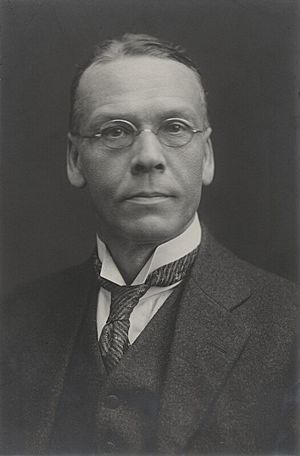William Jackson Pope facts for kids
Quick facts for kids
Sir
William Jackson Pope
|
|
|---|---|
 |
|
| Born | 31 March 1870 London, England
|
| Died | 17 October 1939 (aged 69) Cambridge, England
|
| Known for | Stereochemistry |
| Awards |
|
| Scientific career | |
| Fields | Chemistry |
| Doctoral students | F. G. Mann |
| Influences | H. A. Miers |
Sir William Jackson Pope (born March 31, 1870 – died October 17, 1939) was an important English chemist. He was known for his work in understanding the shapes of molecules, a field called stereochemistry. He also played a key role in chemical research during World War I.
Contents
Early Life and Education
William Jackson Pope was born in Hoxton, London, on March 31, 1870. His father, William, was a saddler, and his mother was Alice Hall. William was the oldest of eight children in his family.
A Young Scientist's Start
In 1878, William started attending the Central Foundation School in London. He was a very quick learner. By the age of twelve, he had enough free time to do simple chemistry experiments in his own bedroom! He also became a skilled photographer. Many of his early photos were still in perfect condition fifty years later.
College Studies
After school, William went to the Finsbury Technical College. There, he learned a lot from a chemist named Henry Edward Armstrong. They later became very close friends.
Discoveries in Chemistry
William Pope studied crystallography, which is the science of how crystals are formed and structured. He worked with Henry Alexander Miers and used a special tool called a goniometer to measure crystals. These studies helped him to imagine the shapes of molecules in 3D space.
Understanding Molecule Shapes
His work led him into the field of stereochemistry. This is a part of chemistry that looks at how atoms are arranged in space to form molecules. William Pope made big discoveries by separating different forms of molecules that were "asymmetric." These molecules were like left and right hands – they were mirror images but couldn't be perfectly placed on top of each other. He worked with compounds containing elements like nitrogen, sulfur, tin, and selenium.
Becoming a Professor
Because of his important work, William Pope became a professor of chemistry. In 1901, he was appointed to a special teaching position at the Manchester Municipal School of Technology. Then, in 1908, he moved to the famous Cambridge University to become a chemistry professor there. In 1902, he was also made a Fellow of the Royal Society, which is a very respected group of scientists.
Contributions During Wartime
During the First World War, Sir William Pope used his chemistry skills to help his country. He worked for the British Navy on the Board of Invention and Research. He also served on the Chemical Warfare Committee for the Ministry of Munitions. One of his important contributions was improving a way to make a chemical used in warfare.
Awards and Leadership
For his service during the war, William Pope received high honors. He was made a Commander of the Order of the British Empire in 1918. In 1919, he was knighted, becoming Sir William Jackson Pope. He was the only chemist to receive a knighthood for his work during World War I. He also led important chemistry organizations, serving as president of the Chemical Society from 1917 to 1919, and of the International Union of Pure and Applied Chemistry from 1923 to 1925.
Later Life
Sir William Jackson Pope passed away in Cambridge on October 17, 1939, after being ill for some time. He was never married. A special service was held for him at St John’s College Chapel in Cambridge.
 | William M. Jackson |
 | Juan E. Gilbert |
 | Neil deGrasse Tyson |

